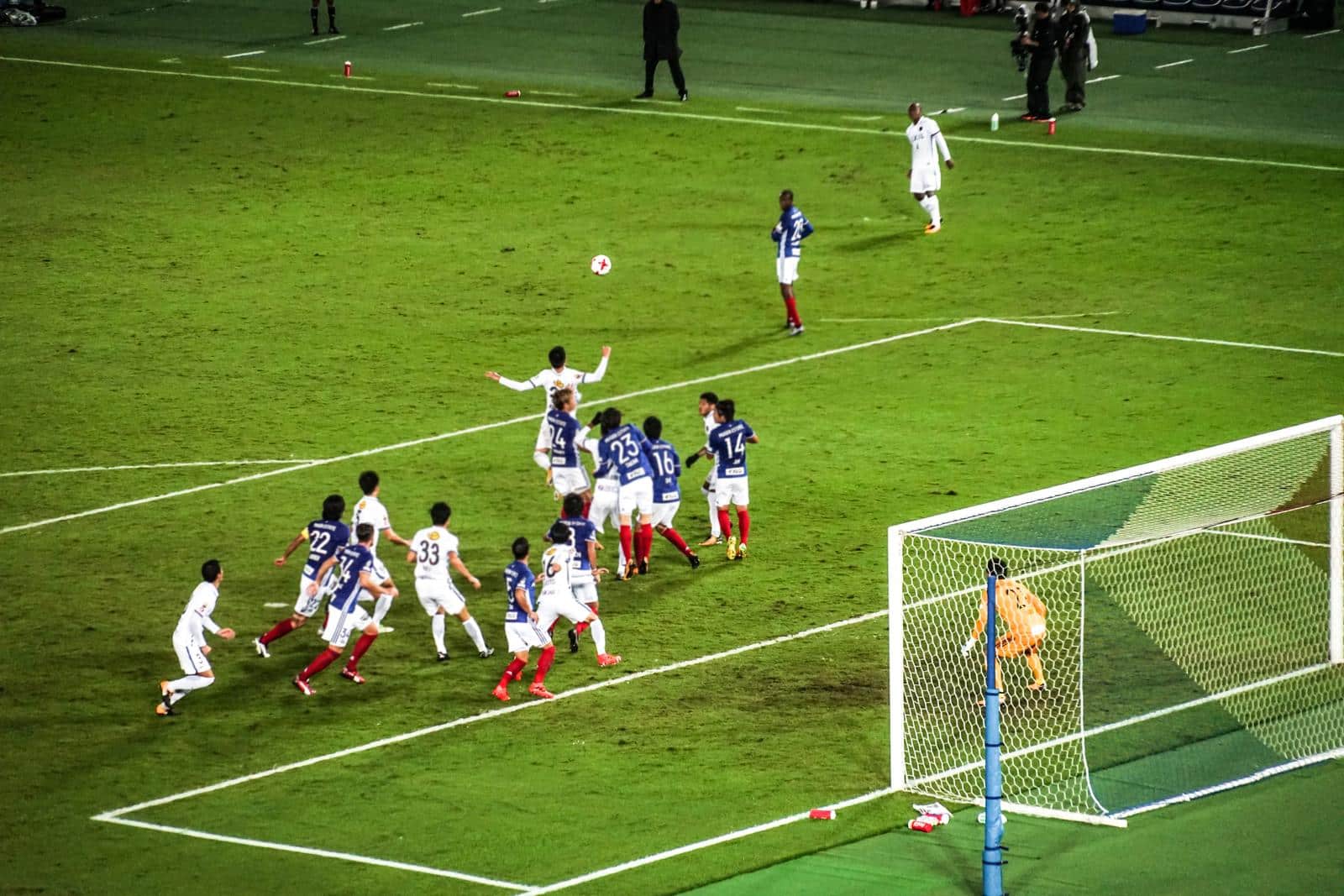While few people might dismiss it as simply a game of kicking a ball, others embrace it as a way of life. Football, also known as soccer in some countries, is the largest and fastest-growing sport worldwide.
According to FIFA (International Federation of Association Football), over five billion people watched the Football World Cup in 2022, a record unmatched by any other sport.
With its rich history and unparalleled popularity, this beautiful game captivates hearts and minds worldwide.
This article will aim to advise footballing beginners on how to pick up the sport most effectively, as well as a general overview of the history. It’s important to understand the exponential progression of the sport and where it’s heading.
How Should a Beginner Start Playing Football?
As someone who has played football for most of my life, I can attest that it’s much more than just a sport. Football offers camaraderie, entertainment, and numerous benefits beyond the game itself.
You might be wondering, “Why should I get into football?” or “What’s so great about it?” The answers lie in the countless benefits that playing football provides.
I began my football journey at the age of five. At that early age, you’re still learning to read and write, let alone understand the intricacies of a sport.
Playing football was purely for fun, with no real connection to the game itself. Children gravitate towards activities they enjoy, and for me, football was that passion.
From my experience, there’s no ‘right’ way to start playing a sport. There can be many factors that come into play, such as accessibility, location, passion, desire, and various other things.
Here are a few initial steps you can take to get you on the right track.
Find a local club to join:
This is incredibly important to do. By joining a community of like-minded individuals, your passion for playing will be fuelled by those around you.
Buy appropriate gear:
Making sure to buy proper football boots, shinpads, socks and training gear equips you with what you need to hit the floor running… literally! There are amazing organisations that help assist families financially with sporting equipment, such as Levelling the Playing Field and Sport New Zealand.
Understand the rules:
Invest time into watching YouTube videos of others playing. Understanding the simplest of rules will set you up quickly.
Finally, make sure to dedicate time each week to practice. Buy a cheap $20 ball and head to the local park. The most basic drills can help you with control, power, IQ, and agility.
Football explained for ‘dummies’
To make it as easy to understand as possible, there are a few fundamental things we’ll cover. (This section is basically if you have no idea what the game is like at all)
The Main Objective
The aim is to score more goals than the opponent by getting the ball into their net.
How Many Players Are There?
Each team has eleven players, including the goalkeeper.
What Are The Positions?
Players are divided into defenders, midfielders, and forwards, each with specific roles.
Main Rules Of The Game
Basic rules include no hands (except for the goalkeeper), offside, fouls, and free kicks.
What Is The Field Like?
The field is rectangular with a goal at each end.
How Long Is An Average Match?
A standard match consists of two 45-minute halves.
How Does The Scoring Work?
A goal is scored when the ball completely crosses the goal line.
How Do You Win The Game?
The team with the most goals at the end of the match wins.
Now that the basics have been explained, we can move on to a few things you can practice in the beginning to pick up skills specifically needed for Football.
Control:
Practice keeping the ball close to your feet while moving.
Speed:
Learn to dribble at different speeds, maintaining control.
Direction:
Practice changing directions quickly with the ball.
Techniques:
Learn different dribbling techniques like the inside and outside cut.
Wall Drills:
Use a wall to practice passing and receiving.
Cone Drills:
Set up cones to practice dribbling and agility.
Fitness:
Focus on exercises that improve stamina, speed, and strength.
Online Resources:
Utilise online tutorials and drills to enhance your skills.
After practicing these skills, you’re on your way to becoming a skilful player! Here are a few tips to help you develop your skillset faster…
Attend Matches:
Experience the excitement of live football by attending matches. Attending matches also helps you to see how other people play. Even just taking mental notes can go a long way!
Learn the Chants:
Join in with fan chants to feel part of the community. While this is more about fun, learning a few chants helps you immerse yourself in football culture.
If you were going to be attending a Wellington Phoenix game, learn their main chant. If you’re going overseas where the chanting is more prominent, make sure to learn some of their chants too.
Follow Player Stories:
Keep up with player transfers, injuries, and achievements. Staying updated with the football community online helps you understand football terminology and current trends.
Engage in Discussions:
Join football forums and social media discussions. This is one of the fastest and most straightforward ways of improving your ‘Football IQ.’ Learning things from others, seeing online news in the community, and reading articles will help you tremendously.
Football is not just about playing the game, it’s also about being part of the global community. Finding clubs and countries to support can make this involvement even more rewarding and meaningful.
History of Football and its Ancient Origins:

The origins of football trace back to ancient civilisations, where various forms of ball games were played. Many countries played a part in the development of what we call football today. Here’s a list of a few.
China:
The earliest known version of a similar game was “Cuju,” played in China during the Han Dynasty (206 BC – 220 AD). Cuju involved kicking a leather ball into a small net and served as a popular form of military training.
Greece and Rome:
In ancient Greece, the game “Episkyros” was popular, while the Romans played a similar game known as “Harpastum.” Both games involved using feet and hands to control a ball and score points.
Medieval Europe:
During the medieval period, variations of football were played throughout Europe. These games were often chaotic and involved entire villages, with few rules and frequent violence.
England:
In England, “mob football” was a popular pastime. These games were rough, involving hundreds of players, and were often banned by authorities due to their disruptive nature.
The Birth of Modern Football
The modern form of football began to take shape in the 19th century in England, with public schools such as Eton, Harrow, and Rugby developing their versions of the game, each with different rules.
1848:
The Cambridge Rules were established, providing one of the first attempts to standardise football’s rules.
1863:
The formation of the Football Association (FA) in England marked a significant milestone. The FA standardised the rules, distinguishing football from rugby, which allowed handling the ball. The FA’s rules prohibited the use of hands (except for the goalkeeper) and established the foundations of modern football.
The Wide Spread of Football
As the British Empire expanded, so did the game of football. British sailors, merchants, and soldiers introduced the sport to various parts of the world.
Europe:
Football quickly gained popularity across Europe. Countries like Italy, Germany, and Spain embraced the game, each developing their unique football culture.
South America:
British immigrants brought football to South America, where the sport truly flourished. Nations such as Argentina, Brazil, and Uruguay developed strong football cultures and produced many legendary players.
Africa and Asia:
Football also spread to Africa and Asia, where it became a beloved sport. These regions adopted and adapted football, contributing to its global diversity and richness.
International Competitions
The global appeal of football led to the establishment of international competitions that developed from simple beginnings into the high-level sports events of today. Here’s a timeline of that development.
1904:
The Fédération Internationale de Football Association (FIFA) was founded to oversee and govern international football, setting the stage for global competitions.
1930:
The inaugural FIFA World Cup was held in Uruguay, with the host nation emerging as champions. The World Cup, now held every four years, has become the most prestigious tournament in football, captivating audiences worldwide.
1955:
The UEFA Champions League, originally known as the European Cup, was introduced. Featuring top teams from across Europe, it has grown into one of the most prestigious and competitive club competitions in the world.
Football in the Modern Era
Football’s popularity continued to soar throughout the 20th and 21st centuries, transforming it into a global phenomenon.
Commercialisation of Football:
Significant investments, sponsorships, and television deals have commercialised football, leading to the creation of highly lucrative leagues such as the English Premier League, La Liga, Bundesliga, and Serie A. A few standout names you might be familiar with are Lionel Messi, David Beckham, Cristiano Ronaldo or Pele.
Advanced Technology:
Technological advancements have also impacted football. The introduction of goal-line technology and the Video Assistant Referee (VAR) system aimed to reduce human error and ensure fair play.
Football’s Global Impact
Football has evolved beyond being merely a sport; it has become a cultural and social phenomenon that unites people from diverse backgrounds, promotes physical fitness, and fosters a powerful sense of community and national pride.
One of the greatest aspects is how the sport brings people together to share a common passion, creating a beautiful sense of togetherness. Major tournaments like the World Cup and the UEFA European Championship epitomise this unity, bringing nations together to celebrate their love for the beautiful game.
The End Goal:
The goal for this article was to provide newcomers with a comprehensive introduction to football, offering tips and strategies to help you develop a passion for the sport. An overview of the history should also help paint a picture of how rapid the sport has grown over the last few centuries and can only be indicative of what’s still to come!
Remember, there is no ‘right’ way to embrace football. Engage with knowledgeable individuals, invest in a good pair of boots and a ball, and head to your local pitch. Your new passion awaits you!
We have other sports you can learn about, like cricket.
If you’re wanting to learn photography, check out our Beginner’s Guide to Stunning Photos!
